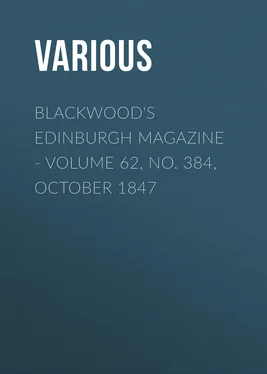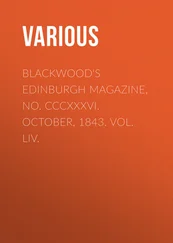Various - Blackwood's Edinburgh Magazine - Volume 62, No. 384, October 1847
Здесь есть возможность читать онлайн «Various - Blackwood's Edinburgh Magazine - Volume 62, No. 384, October 1847» — ознакомительный отрывок электронной книги совершенно бесплатно, а после прочтения отрывка купить полную версию. В некоторых случаях можно слушать аудио, скачать через торрент в формате fb2 и присутствует краткое содержание. Издательство: Иностранный паблик, Жанр: foreign_antique, periodic, foreign_edu, на английском языке. Описание произведения, (предисловие) а так же отзывы посетителей доступны на портале библиотеки ЛибКат.
- Название:Blackwood's Edinburgh Magazine - Volume 62, No. 384, October 1847
- Автор:
- Издательство:Иностранный паблик
- Жанр:
- Год:неизвестен
- ISBN:нет данных
- Рейтинг книги:5 / 5. Голосов: 1
-
Избранное:Добавить в избранное
- Отзывы:
-
Ваша оценка:
- 100
- 1
- 2
- 3
- 4
- 5
Blackwood's Edinburgh Magazine - Volume 62, No. 384, October 1847: краткое содержание, описание и аннотация
Предлагаем к чтению аннотацию, описание, краткое содержание или предисловие (зависит от того, что написал сам автор книги «Blackwood's Edinburgh Magazine - Volume 62, No. 384, October 1847»). Если вы не нашли необходимую информацию о книге — напишите в комментариях, мы постараемся отыскать её.
Blackwood's Edinburgh Magazine - Volume 62, No. 384, October 1847 — читать онлайн ознакомительный отрывок
Ниже представлен текст книги, разбитый по страницам. Система сохранения места последней прочитанной страницы, позволяет с удобством читать онлайн бесплатно книгу «Blackwood's Edinburgh Magazine - Volume 62, No. 384, October 1847», без необходимости каждый раз заново искать на чём Вы остановились. Поставьте закладку, и сможете в любой момент перейти на страницу, на которой закончили чтение.
Интервал:
Закладка:
We must relate his going forth in his own words. Never, surely, on the part of all the actors in it, was there a scene of such singular simplicity.
"My mother said that I must be confirmed, in order that I might be apprenticed to the tailor trade, and thus do something rational. She loved me with her whole heart, but she did not understand my impulses and my endeavours, nor, indeed, at that time did I myself. The people about her always spoke against my odd ways, and turned me into ridicule. (They only saw the ugly duckling in the young swan.)
"We belonged to the parish of St Knud, and the candidates for confirmation could either enter their names with the provost or with the chaplain. The children of the so-called superior families, and the scholars of the grammar-school, went to the first, and the children of the poor to the second. I, however, announced myself as a candidate to the provost, who was obliged to receive me, although he discovered vanity in my placing myself among his catechists, where, although taking the lowest place, I was still above those who were under the care of the chaplain. I would, however, hope that it was not alone vanity that impelled me. I had a sort of fear of the poor boys, who had laughed at me, and I always felt as it were an inward drawing towards the scholars of the grammar-school, whom I regarded as far better than other boys. When I saw them Playing in the churchyard, I would stand outside the railings, and wish that I were but among the fortunate ones—not for the sake of the play, but for the many books they had, and for what they might be able to become in the world.
"An old female tailor altered my deceased father's greatcoat into a confirmation suit for me; never before had I worn so good a coat. I had also, for the first time in my life, a pair of boots. My delight was extremely great; my only fear was that every body would not see them, and therefore I drew them up over my trousers, and thus marched through the church. The boots creaked, and that inwardly pleased me, for thus the congregation would hear that they were new. My whole devotion was disturbed. I was aware of it, and it caused me a horrible pang of conscience that my thoughts should be as much with my new boots as with God. I prayed him earnestly from my heart to forgive me, and then again I thought upon my new boots.
"During the last year I had saved together a little sum of money. When I counted it over, I found it to be thirteen rix-dollars banco (about thirty shillings.) I was quite overjoyed at the possession of so much wealth; and as my mother now most resolutely required that I should be apprenticed to a tailor, I prayed and besought her that I might make a journey to Copenhagen, that I might see the greatest city in the world.
"'What wilt thou do there?' asked my mother.
"'I will become famous,' returned I; and I then told her all that I had read about extraordinary men. 'People have,' said I, 'at first an immense deal of adversity to go through, and then they will be famous.'
"It was a wholly unintelligible impulse that guided me. I wept and prayed, and at last my mother consented, after having first sent for a so-called wise-woman out of the hospital, that she might read my future fortune by the coffee-grounds and cards.
"'Your son will become a great man!' said the old woman; 'and in honour of him all Odense will one day be illuminated.'
"My mother wept when she heard that, and I obtained permission to travel."—(p. 27.)
So, at the age of fourteen, with thirty shillings in his pocket, and his idea of becoming famous by going through a deal of adversity, he comes to Copenhagen—the Paris, the more than the Paris of Denmark, for, in respect to all that a great town collects or fosters, Copenhagen is literally Denmark. There never was a stranger history than this of young Andersen's. It is more like a dream than a life; it is like one of his own tales for children, where the rigid laws of probability are dispensed with in favour of a quite free and rapid invention. The theatre is his point of attraction: but he was by no means determined in what department, or under what form, his universal genius shall make its appearance. He will first try dancing. He had heard of a celebrated danseuse , a Madame Schall. To her he goes with a letter of introduction, which he had coaxed out of an old printer in Odense, who, though he protested he did not know the lady, was still prevailed upon to write the letter. Dressed in his confirmation suit, a broad hat upon his head, his boots, we may be sure, not forgotten, which were worn, however, this time under the trousers, he finds out the residence of Madame Schall, rings at the bell, and is admitted. "She looked at me with great amazement," writes our author, "and then heard what I had to say. She had not the slightest knowledge of him from whom the letter came, and my whole appearance and behaviour seemed very strange to her. I confessed to her my heartfelt inclination for the theatre; and upon her asking me what character I thought I could represent, I replied Cinderella. This piece had been performed in Odense by the royal company, and the principal character had so taken my fancy, that I could play the part perfectly from memory. In the mean time I asked her permission to take off my boots, otherwise I was not light enough for this character; and then, taking up my broad hat for a tambourine, I began to dance and sing—
'Here below nor rank nor riches
Are exempt from pain and wo.'
My strange gestures and my great activity caused the lady to think me out of my mind, and she lost no time in getting rid of me."
We should think so. Only imagine some wild colt of a boy, one of those young Savoyards, for instance, who are in the habit of dancing round the organ they are grinding, apparently to convince the world how sprightly the tune is—imagine a genius of this natural description introducing himself into the drawing-room of a Taglioni or an Elssler, and commencing forthwith, "with great activity," to give a specimen of his talent! Just such as this must have been the part which young Andersen performed in the saloon of Madame Schall.
As the dancing does not succeed, he next offers himself as an actor—proceeding, quite as a matter of course, to the manager of a theatre to ask for an engagement. The manager was facetious—said he was "too thin for the theatre." Hans would be facetious too. "Oh," he replied, "if you will but engage me at one hundred rix-dollars banco salary, I shall soon get fat." Then the manager looked grave, and bade him go his way, adding, that he engaged only people of education.
But he had many strings to his bow—he could sing. It was at the opera evidently that he was destined to become famous. Here he met with what, for a moment, looked like success. A voice he certainly possessed, though uncultivated, and Seboni, the director of the Academy of Music, promised to procure instruction for him. But a short time afterwards he lost his voice, through insufficient clothing, as he thinks, and bad shoe leather. (Those boots could not be new always—doubtless got sadly worn tramping through the streets of Copenhagen.) Seboni dropped his protégé , counselled him to go back to Odense, and learn a trade.
As well learn a trade in Copenhagen, if it was to come to that. He still stayed in the capital, and still lingered round the theatre, sometimes getting a lesson in recitation, sometimes one in dancing, and overjoyed if only as one of a crowd of masked people he could stand before the scenes. There never surely was so irrepressible a vanity combined with so sensitive a temperament; never so strong an impulse for distinction accompanied with such vague notions of the means to attain it. At this period of his life his utter childishness, his affectionate simplicity, his superstition, his unconquerable vanity, present a picture quite unexampled in all biographies we have ever read. He has to make a bargain with an old woman (no better than she should be) for his board and lodging. She had left the room for a short time; there was in it a portrait of her deceased husband. "I was so much a child," he says, "that, as the tears rolled down my own cheeks, I wetted the eyes of the portrait with my tears, in order that the dead man might feel how troubled I was, and influence the heart of his wife."
Читать дальшеИнтервал:
Закладка:
Похожие книги на «Blackwood's Edinburgh Magazine - Volume 62, No. 384, October 1847»
Представляем Вашему вниманию похожие книги на «Blackwood's Edinburgh Magazine - Volume 62, No. 384, October 1847» списком для выбора. Мы отобрали схожую по названию и смыслу литературу в надежде предоставить читателям больше вариантов отыскать новые, интересные, ещё непрочитанные произведения.
Обсуждение, отзывы о книге «Blackwood's Edinburgh Magazine - Volume 62, No. 384, October 1847» и просто собственные мнения читателей. Оставьте ваши комментарии, напишите, что Вы думаете о произведении, его смысле или главных героях. Укажите что конкретно понравилось, а что нет, и почему Вы так считаете.












